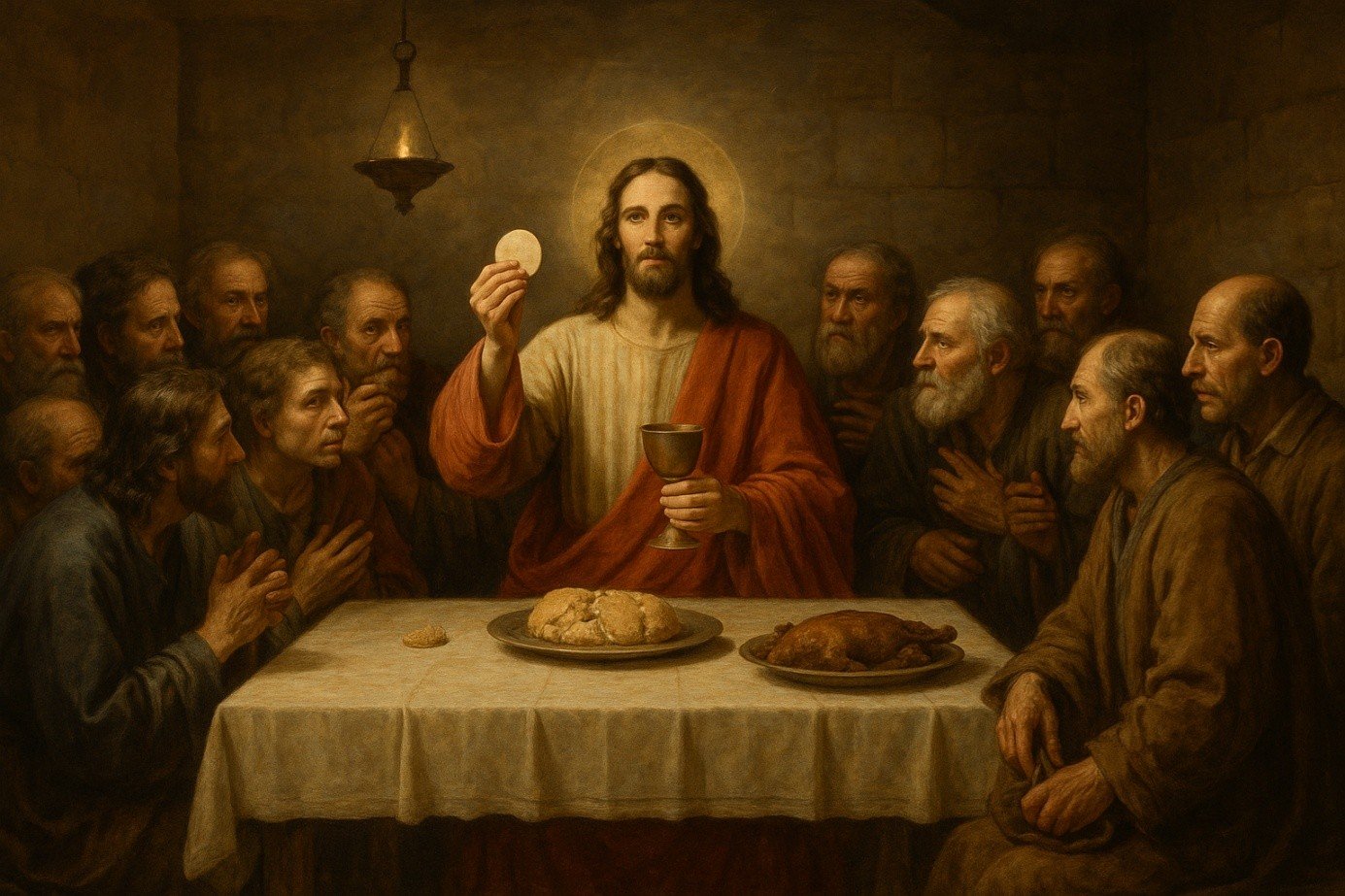By F. Luis Casasus, General Superior of idente missionaries
Commentary on the Sunday Gospel of 14-5-2017, Fifth Sunday of Easter (Acts of the Apostles 6:1-7; First Letter of Peter 2:4-9; John 14:1-12)
Today’s Gospel reading represents Jesus’ answer to the question: But how can we follow you? By being members of His royal priesthood.
Please, let us read with humility these words of Saint John Paul II:
In effect, the baptismal priesthood of the faithful exercised in the sacrament of marriage constitutes the basis of a priestly vocation and mission for the spouses and family by which their daily lives are transformed into spiritual sacrifices acceptable to God through Jesus Christ [1 Pt 2: 5]. This transformation is achieved not only by celebrating the Eucharist and the other sacraments and through offering themselves to the glory of God, but also through a life of prayer, through prayerful dialogue with the Father, through Jesus Christ, in the Holy Spirit. (Familiaris Consortio).
This referring of the ministerial or ordained priesthood to what John Paul would frequently call the baptismal priesthood, common to all the faithful, to all baptized Christians, both non-ordained and ordained, is extremely important, for it enables us to suggest that the most fundamental sharing in Christ’s priesthood takes place through baptism. It is the Church, the community of the baptized, which is a chosen race, a royal priesthood, a holy nation, God’s own people (1 Pet 2:9). The ordained priesthood exists in the Church as a ministry of service in order to enable the Church to be what it is called to be, a priestly people.
Today’s Gospel is part of the long conversation (Jn 13:1 to 17:26) between Jesus and his disciples at the last supper, on the eve of his apprehension and death, it is the Testament he left us. In it Jesus expresses his last desire concerning life in community for his disciples.
How can we live in community with so many different opinions? Jesus replies with an exhortation: Do not let your hearts be troubled! There are many rooms in my Father’s house! The insistence on encouraging words that would help to overcome the troubles and divergences means that there must have been different tendencies among people, each claiming to be truer than the other. Jesus says: There are many rooms in my Father’s house! It is not necessary for all to think alike. What matters is that all accept Jesus as the revelation of the Father and that, for love of him, all take on an attitude of service and love. Love and service are the concrete, which binds together the many bricks of the wall and makes the diverse persons and communities into one Church of brothers and sisters.
In concrete terms, how can I become a priestly person? Of course, it is not only the fruit of my personal effort, but that of a cooperation with the Holy Spirit. Simply put, from the viewpoint of this priesthood, here are some tangible manifestations, some visible signs of this sharing in Christ’s personality:
1. A priestly person is a Person of the Eucharist. If we are to become authentic priests of Jesus Christ, we must become people who are living sacrifices; people who are grateful and live lives of gratitude. Especially in the Eucharist, when the celebrant says: Pray, friends, that our sacrifice may be acceptable to God, the almighty Father, we have to consciously and explicitly make the offering of our life: sufferings, joys, impotence and dreams.
When we receive the Eucharist, we partake of the one who becomes food and drink for others. So must it be for us who receive Christ’s body and blood: our lives, too, must and can become a feast for the poor. We too must become food and drink for the hungry.
Eucharist and constant prayer: if we find ourselves lacking in zeal to be His priest, that is to proclaim Jesus as the Way, the Truth and the Life to others, it is because we do not know Jesus sufficiently. If we know Jesus personally and realize His utter love for us, we will want to make Him known to all. In the final analysis, it is only a state of prayer that makes us true priests of God. Before we can lead others to God, it presupposes that we know Him intimately ourselves.
2. A priestly person is a Bearer of Joy. The joy of the priesthood finds its origin in the heart and mind of Christ. Before taking leave of the Apostles on Holy Thursday Jesus said to them: I tell you this that my joy may be full!
A disciple of Christ can be an energetic and active person, but if he or she produces discomfort, bitterness or uneasiness, his/her life will not remind us the life of Jesus…
3. A priestly person is a Beacon of Hope. The world needs God, otherwise it remains without hope, wrote Pope Benedict in his encyclical letter “Spe Salvi.” The reason for this is simple:
The presence of the finitude of the things of this world in our conscience does not define us; rather, it is the presence of the infinitude of the Absolute which defines us. What defines us is the more, never the less, as we have affirmed previously. For this reason, every human being has desire, aspiration and thirst for the Absolute; tendency towards what is good, truth and beauty; capacity to love, believe and hope (Fernando Rielo, Mystical Conception of Anthropology).
Benedict XVI highlighted the life of one brilliant light and witness of hope in his encyclical on hope: the life of Cardinal Francis Xavier Nguyen Van Thuan (1928-2002): “The late Cardinal Nguyen Van Thuan, a prisoner for thirteen years, nine of them spent in solitary confinement, has left us a precious little book: Prayers of Hope. During thirteen years in jail, in a situation of seemingly utter hopelessness, the fact that he could listen and speak to God became for him an increasing power of hope, which enabled him, after his release, to become for people all over the world a witness to hope—to that great hope which does not wane even in the nights of solitude.”
4. A priestly person is a Model of Compassion. In the Old Testament, an attitude of compassion toward sinners appeared to be very foreign to the priesthood.
Unlike the Levitical priests, the death of Jesus was essential for his priesthood. He is a priest of compassion. His authority attracts us because of his compassion, the authority of his words, his penetrating, loving gaze at each one of us, the steadfastness of his faith. Ultimately, he exists for others: He exists to serve.
Jesus’ compassion is much more than a fleeting or temporary feeling of regret or sorrow. It is rather a deep affliction, a gut-wrenching type of sorrow over the condition of people. The compassion of Jesus heals and feeds, forgives huge debts, nurses hurt bodies back to health and welcomes home sinners, restoring them to a place of honor. His strong emotion moved him to act, far beyond what any shepherd would be expected to do for his sheep.
A priestly person is one who spends himself or herself gladly for others. We must look at our own priesthood, whether it be the priesthood of the baptized or the ministerial priesthood, and ask ourselves for whom we really live and who we really love. Do we spend ourselves gladly for others? Do we show compassion to our brothers and sisters who are broken, suffering, on the fringes of society and of the Church?
5. A priestly person is an agent of the New Evangelization. Evangelization ad gentes refers to those who do not yet know Jesus Christ, and the new evangelization is directed towards those who have moved away from the Church, those who have been baptized but not sufficiently evangelized. This is in the heart of our idente charism!
To be an apostle means to share the world’s deep desire for salvation and render our faith intelligible by communicating the logos of hope: Always be ready to give an answer to every man who asks you for a reason for the hope that is in you, with gentleness and fear (1 Pt 3:15). Humanity needs hope to live in these present times. The content of this hope is “God, who has a human face and who ‘has loved us to the end’.”
To be unaware of this need creates a desert and an emptiness. In fact, the obstacles to the new evangelization are precisely a lack of joy and hope among people, caused and spread by various situations in our world today. Oftentimes, this lack of joy and hope is so strong that it affects the very life of our communities. This is the reason for renewing the vision of our apostolic mission, not simply as an added responsibility but as a way to restore joy and life to situations imprisoned in fear.
On the part of the HS, his concrete and explicit mission includes a renewal of our Faith, Hope and Charity:
Therefore we do not lose heart, but though our outer man is decaying, yet our inner man is being renewed day by day (2 Cor 4:16).
In our Mystical Examination (Transfigurative Union) I have to observe that Faith, Hope and Charity are never the same. They change, and frequently in surprising ways. For example, when I experience the light of faith in dark moments (something I could not anticipate) or when I feel hope and strength right after having gravely sinned, or when I feel love for those people who have differing views of life especially those whom we don’t have much in common, those who are challenging and those who are even my enemies… especially those who reject my attempts to love them.
Let us wake up, for these things are already occurring in our lives. It is not an award or a trophy to a certain “level of holiness”, but graces and gifts that we are not used to observe and notice. We see and little by little learn each day through the interior teaching of the Holy Spirit that the new man has a new way of thinking and living.
Jesus tells Philip bluntly that whoever believes in Him will do the works that He does, and will do greater ones than these. Our call this day is to believe and to see Christ at work in our heart, in our neighbor and in the Church which He founded, not matter how sinful that Church may be at times. Faith allows us to recognize Christ everywhere.











